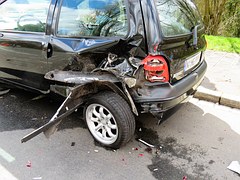If I Get Hit From Behind, Is The Other Driver Automatically At Fault?
Is the driver that strikes from behind responsible? Seasoned Maryland car and automobile accident lawyers will tell you the answer, generally, is yes, but it is not an automatic result. All drivers must use reasonable care for the safety of others. The following driver must use due care for the safety of others, including the duty to follow a car only as close a road conditions, traffic flow, speed, and prudence allow.
If one of those drivers follows too closely, or fails to pay attention, and strikes the driver in front, then, yes, generally, they are at fault. But how close is too close?
Of course, we are all familiar with the calculations showing that is takes about 55 feet to stop a car traveling 55 mph on dry asphalt.

This does not take into account ‘reaction time’- but rather runs from the moment the brakes are applied. But the liability determination is far from an automatic mathematical calculation. The law is also clear on this point. There are no automatic determinations. The mere fact that a rear end motor vehicle collision occurred does not create any presumption that the operator of the striking car was negligent.1
There is a duty to use reasonable care to stop from hitting the car in front of you, but this duty necessarily takes into account things like:
- road conditions
- weather conditions
- time of day
- fog or smoke
- the flow of traffic, and
- presence of pedestrians
- if the accident is in a rural or urban setting
As Attorney Eric T. Kirk will tell you. Maryland law imposes obligations on all motorists. The driver of the car in front has responsibilities too. They must signal or indicate an intention to:
- slow
- stop, or
- turn.
If they fail to adhere to these, it may well be that they caused or contributed to the accident. Indeed, some finders of fact have been able to pierce the testimony or see past the facts to determine that a driver struck from behind was responsible, at least in part, for causing the subject motor vehicle accident.
The concept of “brake failure” comes up in some of these rear-end impact claims. Maryland car and automobile accident lawyers have won cases by demonstrating that the brakes on the defendant’s car “failed”. At first glance, one may think that “brake failure” is an excuse that would relieve the following driver of responsibility for causing an accident any time it is claimed. To the contrary, sudden brake failure actually creates the presumption of negligence on the part of the owner of the following vehicle. It is then up to that owner to present proof that he or she had her car properly maintained, and that there was no reason to expect failure. Miller v. Reilly, 319 A.2d 553. The burden is perhaps lower if the involved driver does not own the car this is being used. A non-owner operator can satisfy his or her obligation of due care by simply making sure the brakes work prior to driving the vehicle.
Some special Rules of the Road may also apply. Any truck driver outside of a residential or business district, and any driver outside of a business district or residential district in a caravan or motorcade, must allow such space between vehicles so that another vehicle may enter that space safely.
Although in most cases, the usual result is that the following driver is going to be at fault. The result is not automatic. It is a case you should win, and I’d be happy to sit down and personally discuss the specifics of your claim with you. Contact me. 410 591 2835.
FN1. But see, ANDRADE v. HOUSEIN, 810 A.2d 494 (2002), stating that where a car is lawfully stopped waiting to enter an intersecting roadway, and then hit from behind, causing injury, the following driver is presumptivley negligent.



